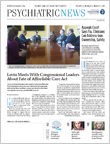The American Diabetes Association (ADA) has launched a new multipronged initiative to systematically address psychosocial and mental health aspects of diabetes management.
In December, the association published its first-ever position statement on “psychosocial care,” with specific recommendations for its integration into “collaborative, patient-centered medical care” for all patients with diabetes. The statement also advises diabetes providers to consider routinely assessing patients for symptoms of diabetes distress, depression, anxiety, disordered eating, and cognitive capacity required for the tasks involved in diabetes self-management.
The ADA also established an in-house Lifestyle Management Team in 2016 and this year will pilot an educational course designed for licensed mental health providers—including psychiatrists—to gain expertise in diabetes and diabetes-specific psychosocial issues.
“The ADA has taken a huge step by seeking to fill that gap in care. … We’re building a mental health provider education program,” said Alicia H. McAuliffe-Fogarty, Ph.D., C.Psychol., whom the ADA hired full time in 2016 to run the association’s psychosocial initiatives and Lifestyle Management Team.
Erik R. Vanderlip, M.D., M.P.H., who is double-boarded in family medicine and psychiatry with expertise in blending behavioral health and primary care models, applauded the ADA’s move. “I’m delighted to see that an organization with such prestige and expertise as the ADA is endorsing the psychosocial care components of diabetes management and giving them their due. … We know that psychosocial factors and mental illnesses severely impact diabetes outcomes and the cost of care associated with managing diabetes over time.”
New Guidelines for Incorporating Psychosocial Care
The position statement advises clinicians to assess psychosocial and mental health issues using appropriate and validated tools at initial diabetes care visits and periodic intervals, or when there is a change in disease, treatment, or life circumstances.
Situations warranting referral to a mental health provider include ongoing difficulty with diabetes self-care after provision of diabetes education; a positive screen for symptoms of depression, anxiety, or cognitive impairment; or any suspicion of serious mental illness including eating disorders.
The document specifically addresses the entity “diabetes distress,” a common problem resulting from the numerous demands of self-managing diabetes such as medication dosing, glucose monitoring, adherence to diet recommendations, and physical activity.
Special situations, including patients who are taking antipsychotics and counseling for patients who are slated for bariatric surgery, are also addressed in the document.
Referral Versus Integrated Care
While Vanderlip generally agreed with the referral criteria in the statement, he believes that “when possible, evidence-based integration of behavioral health services is far superior to traditional referral models for behavioral health care.”
APA is in the midst of a large, federally supported initiative to improve access to behavioral health services through collaborative care, he noted, and train psychiatrists and primary care physicians to work in the collaborative care model.
Indeed, the ADA has long advocated for that model, and the new statement re-endorses it. “Definitely a team-based approach with a mental health provider integrated into the clinic is very important,” Fogarty said, but added “with cost constraints, many clinics don’t have that, so next best thing is to have a provider for referral in the community.”
Expanding the Pool
Regardless of the delivery model, there just aren’t enough mental health professionals with expertise in diabetes to achieve the integration goal, according to Fogarty. There is a small cadre of psychologists in the United States—numbering just about 50 to 100 individual providers—who specialize in the psychosocial issues associated with diabetes, she said. Building those ranks is the aim of the new educational pilot program that the ADA will launch later this year as pre-courses held in conjunction with the ADA’s and the American Psychological Association’s annual meetings.
The courses, which will provide continuing education credit, will span two days: one in-person session on diabetes basics, the other conducted online. After passing an exam, providers will qualify to be listed in a new ADA online Mental Health Provider referral directory. Psychiatrists are more than welcome to attend, Fogarty said. ■
“Psychosocial Care for People With Diabetes: A Position Statement of the American Diabetes Association” can be accessed
here.

